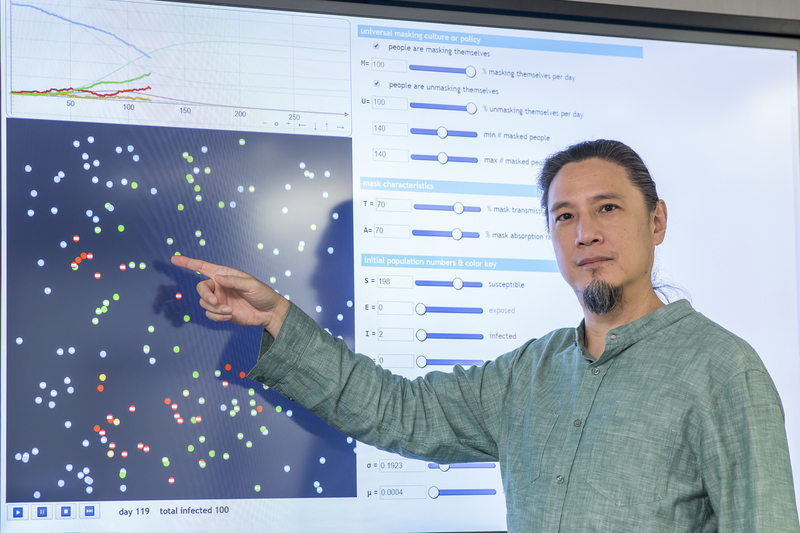
As governments worldwide are planning to gradually ease lockdown or social distancing measures after months of life disruptions due to COVID-19, an interdisciplinary study co-convened by a Hong Kong University of Science and Technology (HKUST) computer scientist has recently found that universal face mask-wearing is an urgent non-pharmaceutical intervention to suppress the spread or second waves of the disease before effective vaccines or treatments are available.
The team, co-convened by the Professor of Computer Science and Engineering, presented two new theoretical models to predict the impact of face mask-wearing over time.
The first extends the standard epidemiological SEIR model to predict the effects of mass face mask-wearing.
The second introduces an AI-inspired agent-based model, which explicitly simulates infections occurring as a result of contact between individuals moving in physical space.
The team also took into account the varying degrees of mask effectiveness and found that the effects hold even with inexpensive, widely available non-medical face masks or homemade masks with only 70% effectiveness – an important factor in regions where medical-grade masks must be reserved for health workers.
The team’s simulation results show that if the vast majority (80%-90%) of the general public adopt masking on about day 50 after an outbreak before lockdown measures are lifted, the number of new COVID-19 infections could be slowed significantly and help avoid a second wave of outbreak.
However, if face masking is not adopted nearly universally by the general public (for example if only half the population adopt masks) or if universal masking is delayed (for example to day 75), then a significant slowing of the virus spread becomes unlikely.
The modelling results were validated and compared against empirical data from regions that have so far best managed their COVID-19 outbreaks such as Hong Kong, and Taiwan, where putting on a face mask in public is culturally acceptable or government policies advise people to do so.
The data comparison shows a near-perfect correlation between early universal masking and successful suppression of daily COVID-19 case growth rates and/or the rates of reduction from peak daily case growth.
In contrast, regions that did not implement early adoption of universal masking have instead needed to maintain a strict societal lockdown, with the attendant huge economic and social costs.
The study – a collaborative effort among an artificial intelligence professor, economist, computational molecular biologist, medical doctor/PhD, and behavioural scientist from Hong Kong, France, Estonia, the UK, and Finland – provides fresh insights into the urgency of putting on face masks in addition to continued physical distancing, increased testing, and contact tracing.
It was noted that locking down our noses and mouths is far preferable to locking down our full bodies inside our homes, the Professor noted.
The cost of masks, including educating populations on how to properly make and wear masks, is negligible in comparison to the large economic and human costs of increased infection rates.
To provide the public and policymakers with a feel of how the mass wearing of face masks impacts the spread of COVID-19, an interactive visualization of the simulation can be found here. Further resources can be found here.
















